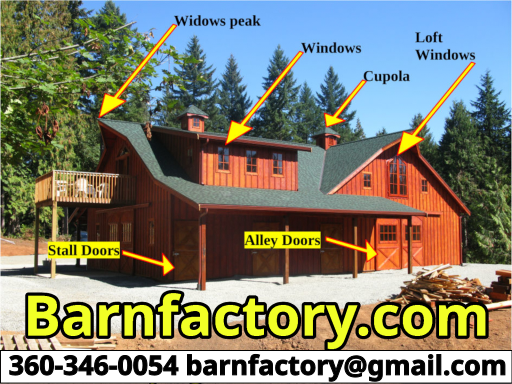There are four basic commonly used foundations, independently or in combination:
1. Post Frame (pole barn)
2. Monolithic Slab
3. Footing and stem wall
4. Concrete pads on or below grade
The pole barn foundation is excellent for farm and shop building use. It consists of pressure treated wood posts (often 6″x6″) buried 3′ to 5′ in the ground resting on a concrete pad as a footing. The posts are easy to fasten siding walls, beams, lofts, and roof trusses to. They are also great for fastening stalls to as they can be spaced to your stall size. 4″ and 6″ concrete floors can often be added after the building is completed relatively fast.
Because the posts are easy to install as long as the holes aren’t too difficult to dig and the terrain isn’t too steep, the post frame (pole barn) foundation is considerably less expensive. It requires only one inspection; however, building with pole barn foundations usually appraise for less value than those with monolithic or stem wall foundations. If your long term use of this building is for home or any other heated purpose, you should seriously consider a monolithic or stem wall foundation.
The monolithic slab foundation usually has a 4″ or 6″ concrete floor with the edges turned down from 12″ to 48″ (commonly 18″ to 24″). Areas of increased loading such as walls and posts have additional depth of concrete with rebar added. The perimeter wall is 6″ to 12″ wide at the base and may taper to an increased width of 12″ to 18″ at the top. Several courses of rebar are added to tie everything together and add rigidity. The slab and sides are poured continuously into one big monolithic foundation, but it is stronger and more easily utilized for multiple uses. Floor heating systems can be easily installed. Walls over mono-slab foundations can be easily stick framed and insulated. Garages and shops with monolithic foundations may one day be converted to housing, making them considerably more valuable. Plumbing should be planned for in advance to avoid extra expenses later.
